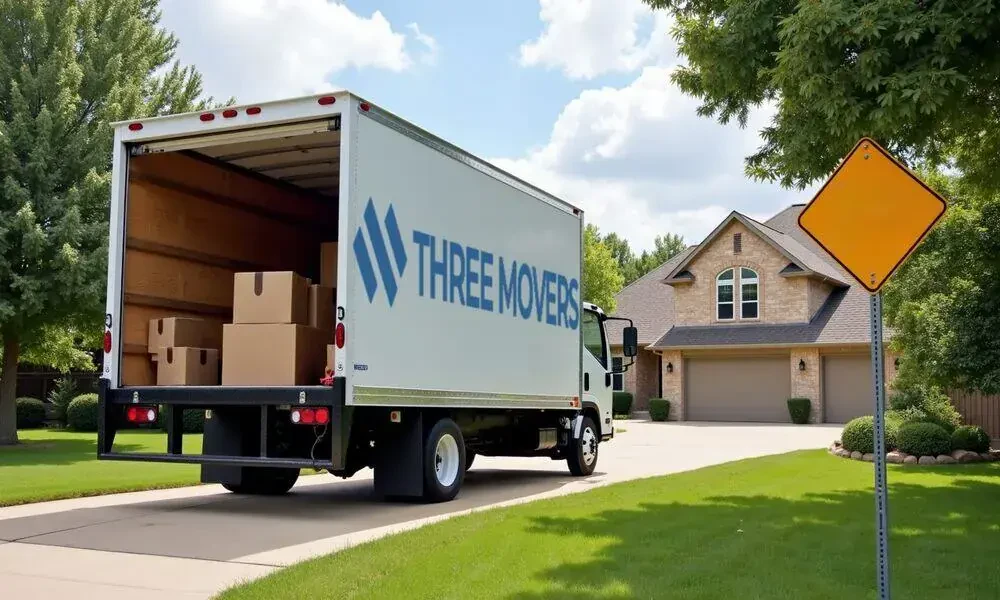Published by Chris Townsend
Last updated Nov, 28 2025

Best Interstate Movers: Reliable Services for Your Long-Distance Move
When planning a long-distance move, choosing the right interstate movers is essential for a smooth transition. These professionals specialize in transporting your belongings across state lines, ensuring safety and efficiency. With various services available, including packing, loading, and unloading, interstate movers can cater to your specific needs. Understanding how to select the best service can make all the difference in your moving experience.
When hiring interstate movers, it is important to consider their reputation, experience, and range of services. Look for reputable companies with positive customer reviews, as well as those that provide comprehensive services such as packing, unpacking, debris removal, and storage options. Additionally, ensure that the movers have experience in handling moves of your size and destination. Always request multiple quotes and compare them to make an informed decision based on your specific needs and budget.

Cross-Country Movers: What You Need to Know
When it comes to planning a hassle-free relocation across the country, choosing the right interstate movers is crucial. With so many options available, it's important to consider certain factors to ensure a smooth and stress-free moving experience.
First and foremost, research reputable national moving companies that specialize in interstate moves. Companies such as Mayflower, United Van Lines, Atlas Van Lines, and Allied Van Lines have established themselves as trusted names in the industry. It's also recommended to avoid brokers and check the Federal Motor Carrier Safety Administration (FMCSA) website for information on licensed and insured moving companies.
For instance, one option is Mayflower, a long-distance moving company known for its range of services and positive customer experiences. They offer packing and unpacking services, car shipping services, clean-up and debris removal services, as well as storage options for long-distance moves. Mayflower's movers are experienced in handling moves of any size, from small apartments to corporate relocations. They even provide international moving services for those settling in another country.

Next, consider reading customer reviews to get an idea of others' experiences with different movers. Pay attention to feedback about timeliness, efficiency, and quality of service. This can help you narrow down your options and make an informed decision.
Lastly, request quotes from multiple companies to compare prices and services offered. This will give you an idea of the cost involved and help you budget accordingly. Keep in mind that the cheapest option may not always be the best choice as reliability and quality of service should also be taken into consideration.
- When planning a hassle-free relocation across the country, it is crucial to choose the right interstate movers. Research reputable national moving companies that specialize in interstate moves and avoid brokers. Check the FMCSA website for information on licensed and insured moving companies. Mayflower is a recommended option, known for its range of services and positive customer experiences. Read customer reviews to get an idea of others' experiences with different movers. Lastly, request quotes from multiple companies to compare prices and services offered, but also consider reliability and quality of service when making a decision.

Top Companies for Interstate Moving
When considering interstate movers, several companies stand out for their reliability and customer satisfaction. Here are some of the top-rated options:
- Allied Van Lines
Known for its extensive network and comprehensive moving solutions tailored to long-distance relocations, Allied Van Lines provides high-touch moving coordinators who offer personalized guidance. Their services include climate-controlled storage and quality packing solutions for fragile items. - U-Haul
U-Haul offers flexible options for those who prefer a DIY approach while providing essential equipment and support. Their extensive network of locations makes it easy to find a rental truck or trailer for your move, along with packing supplies. - Mayflower Transit
With a reputation for excellent customer service, Mayflower Transit offers various plans to suit different budgets. Their experienced staff can assist with everything from packing to unloading, ensuring a smooth transition during your move. - JK Moving Services
This company brings innovation to national relocation with a user-friendly mobile app that tracks progress and manages payments. JK Moving Services is known for its specialized equipment capable of handling unique items like pianos and pools.
Each of these companies specializes in interstate moving, ensuring that your relocation is handled by experienced professionals who understand the unique challenges of long-distance transport. They provide tailored services to meet individual needs, making your move as seamless as possible.

Long-Distance Moving Services
When it comes to planning a hassle-free interstate move, having access to a variety of services can greatly simplify the process. Reputable interstate movers offer an array of services tailored to meet the unique needs of each customer. Whether you're moving from a small apartment or relocating your entire corporate office, these movers have the expertise and resources to handle moves of any size. From packing and unpacking services to car shipping and storage options, they ensure that all aspects of your move are taken care of.
For instance, let's say you're moving from New York City to Los Angeles. The thought of packing up your belongings, driving cross-country, and then unpacking everything in a new city may seem overwhelming. But with professional interstate movers like Mayflower or United Van Lines, you can rest assured knowing that they offer comprehensive services for every step of the journey.
By entrusting these experts with your move, you can focus on other important aspects of the relocation process, such as settling into your new home or transitioning into a new job. Their experience in handling long-distance moves allows them to efficiently navigate potential challenges along the way, ensuring a smoother transition for you.
Now that we understand the importance of a variety of services offered by interstate movers, let's delve into one essential service that can take some stress off your shoulders: the inclusion of packing and cleaning services.
- According to the American Moving and Storage Association, approximately 15% of all moves in the United States are interstate.
- The Federal Motor Carrier Safety Administration (FMCSA) received over 4,780 complaints about interstate moving companies in 2018.
- A study conducted by the FMCSA showed that more than 35% of customers who avail moving services opt for national moving companies like Mayflower, indicating a high level of trust in these brands for long-distance relocations.

Inclusion of Packing and Cleaning Services
One significant benefit offered by reputable interstate movers is the provision of packing and cleaning services as part of their comprehensive packages. Moving involves more than just transporting your belongings from one place to another; it also entails careful packing to ensure the safety of your items during transit.
With professional packers at your disposal, you no longer have to worry about the time-consuming task of individually wrapping each item or figuring out how to maximize space in boxes. These experts have the know-how and experience to efficiently and securely pack your belongings, utilizing high-quality materials to safeguard fragile items. This reduces the risk of damage and ensures that your possessions arrive at your new home in pristine condition.
Additionally, many interstate movers go the extra mile by offering cleaning services for both your old and new residences. Moving can leave your previous home in need of a thorough clean-up, while your new place might require some tidying before settling in. By availing yourself of these services, you can leave behind a spotless space for the next occupants and step into a fresh, clean environment in your new home.
Now that we've explored the inclusion of packing and cleaning services, let's move on to another important aspect to consider when understanding the costing of move services.

Understanding the Costing of Move Services
When it comes to planning a long-distance move, understanding the costing of move services is crucial for budgeting and making informed decisions. The cost of moving services depends on various factors such as the distance between your current and new location, the size of your household, the weight of your belongings, and any additional services you require.
To get an accurate estimate, movers typically consider these key aspects in their calculations:
- Distance: The farther the move, the higher the transportation costs.
- Size and weight: The volume and weight of your items will affect the labor required and possibly increase costs.
- Additional services: Services like packing, unpacking, storage, or specialty item handling will add to the overall cost.
- Time of year: Peak moving seasons may result in higher prices due to increased demand.
By understanding these factors and discussing them with potential movers during consultations, you can receive more accurate estimates tailored to your specific needs.

Actual vs Estimated Quotes
It's important to distinguish between actual quotes and estimated quotes when researching interstate moving companies. An estimated quote provides an approximation based on initial information provided by the customer. This type of quote is helpful for preliminary budgeting purposes but may not reflect the final cost accurately.
On the other hand, an actual quote is a more precise assessment based on a thorough evaluation by a moving company representative. This evaluation typically involves an in-person visit or online assessment where they observe your items and understand any unique requirements. The actual quote takes into account specific details regarding distance, volume/weight, and additional services requested.
For example, let's say you initially received an estimated quote for $3,000 for your long-distance move. However, after a representative from the moving company assesses your belongings during an in-home visit, they provide you with an actual quote of $3,500 due to additional items and services required.
Understanding the difference between estimated and actual quotes helps set realistic expectations and prevents surprises when it comes to pricing. It's always advisable to request an actual quote from your chosen moving company before making a final decision.
Now that we have explored the importance of understanding the costing of move services and the difference between estimated and actual quotes, let's move on to highlighting top movers based on reviews and experiences.

Highlighting Top Movers: Reviews and Experiences
When it comes to selecting the best interstate movers for your relocation needs, it's crucial to gather information about their reputation and customer experiences. This step allows you to gauge the quality of service offered by different companies and make an informed decision.
One effective way to assess a moving company is by reading reviews and testimonials from past customers. These firsthand accounts provide valuable insights into the level of professionalism, efficiency, and overall satisfaction that others have experienced with a particular mover. Online platforms such as Yelp, Google Reviews, or specialized moving review websites can be excellent sources for gathering this information.
Let's say you're considering Company A for your upcoming interstate move. By reading reviews, you may come across a review from a customer who mentions how professional and courteous the movers were throughout the entire process. Another customer might highlight the company's attention to detail in handling fragile items, showcasing their expertise in packing and transporting delicate belongings securely.
Additionally, personal recommendations from friends, family, or colleagues who have recently completed an interstate move can be immensely valuable. These individuals can provide firsthand accounts of their experiences with specific moving companies, revealing essential details that you might not find in online reviews alone. A personal recommendation accompanied by positive feedback can inspire confidence in your decision-making process.
Keep in mind that each person's experience may vary, so it's important to consider multiple reviews and opinions before making a final decision. Look for consistent themes or patterns in the reviews to gain a more accurate understanding of a moving company's strengths and weaknesses.
Furthermore, don't hesitate to reach out to the moving companies directly to inquire about any questions or concerns you may have. Their responses and attentiveness can give you further insight into their commitment to customer satisfaction and communication.
By highlighting top movers through reviews and experiences, you can gain a better understanding of their track record and make an informed decision for your interstate relocation. Remember to consider a combination of online reviews, personal recommendations, and direct communication with moving companies to ensure a hassle-free and successful moving experience.

Frequently Asked Questions
Interstate movers handle state-to-state relocations regulated by FMCSA, managing loading, transport, and delivery across long mileage ranges. Crews typically include 2–4 movers for smaller homes and more for larger multi-bedroom moves. Services may cover packing, furniture protection, disassembly, and delivery coordination. Pricing reflects home size, special items like pianos or safes, long-carry distance, building rules, weather, and route constraints. For customers wanting support beyond transport, a full service option such as full service movers can streamline packing and unpacking.
Most interstate moves take 5–14 days from pickup to delivery, influenced by distance, weather, and FMCSA driving-hour limitations. Larger loads may take longer because carriers consolidate shipments on long-haul routes. Pickup and drop-off windows also depend on building rules, freight elevator scheduling, rural vs metro access, and peak-season congestion on major highways. Packing adds time if movers prepare fragile items, kitchenware, or furniture disassembly before loading day.
Yes. Most carriers provide optional full-service packing using padded wraps, dish packs, wardrobe boxes, and labeled cartons. Packing needs vary by home size, inventory detail, and fragility. Crews may send 2–6 packers for a one-day pack-out, or split work over two days for larger homes. Fragile rooms, artwork, antiques, and electronics require specialized materials. Customers can review options on the packing services page when planning multi-state transport.
Interstate movers issue an FMCSA-required Bill of Lading, inventory list, rights-and-responsibilities packet, and valuation election. Some cities require parking permits for loading, and apartment buildings often mandate certificates of insurance, elevator reservations, or move-in time windows. Long-distance customers should confirm access notes such as narrow streets, loading dock requirements, HOA restrictions, or rural road limitations to prevent delays at pickup or delivery.
Interstate moves usually cost $2,200–$7,500+, depending on distance, home size (studio through 5BR), shipment weight, season, fuel, and access issues like stairs, elevators, or restricted loading zones. Costs rise for fragile packing, oversized items, or winter travel in mountain regions. Typical delivery windows run 5–14 days for most long-distance corridors. Use the company’s estimator or a calculator like the internal moving cost estimator to model mileage-based pricing.
It is best to book 4–8 weeks in advance, and earlier during summer or month-end peaks when long-distance capacity fills quickly. Booking time varies with home size, travel distance, and whether you need full packing. Customers in major metros with strict building rules should schedule early to secure elevator reservations and parking permits. Early planning also helps ensure accurate weight estimates and guaranteed loading windows.
Carriers use certified scales to record empty-truck weight and loaded weight. The difference determines the billable pounds. Weight influences transportation charges, fuel, labor, and delivery timing. Large items like sectionals, bedroom sets, appliances, treadmills, and outdoor equipment significantly affect totals. Homes with long-carry distances, stairs, or complex loading areas may require additional labor beyond weight-based pricing.
Binding estimates lock in pricing for the stated inventory, while non-binding estimates allow final charges to adjust based on actual weight. Binding options provide cost certainty for multi-state moves, especially when transporting 3BR–5BR homes with heavier shipments. Non-binding quotes can be accurate when inventory is stable, but customers should understand weight-ticket rules, delivery timing, and any potential access-related surcharges.


